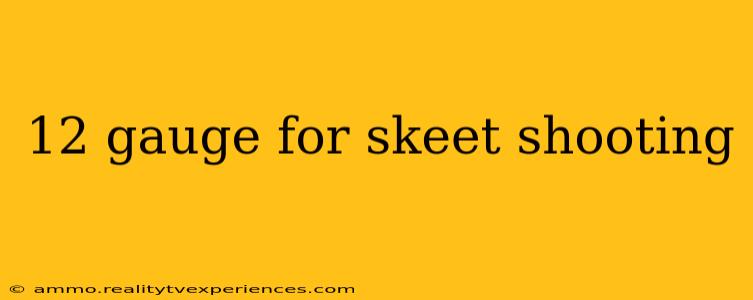Skeet shooting, a popular clay pigeon sport, demands precision, speed, and the right equipment. Choosing the right gauge shotgun is crucial, and the 12 gauge remains a dominant force. This guide delves into why the 12 gauge is a popular choice for skeet and explores factors to consider when selecting a 12 gauge shotgun for this specific discipline.
Why 12 Gauge is Popular for Skeet
The 12 gauge enjoys widespread popularity in skeet shooting for several key reasons:
- Widely Available Ammunition: 12 gauge ammunition is readily available almost everywhere, in various shot sizes and loads, making it convenient for shooters. Finding the perfect load to match your skill and style is easy.
- Versatility: While excellent for skeet, a 12 gauge is also versatile enough for other clay target disciplines like trap and sporting clays, even hunting. This makes it a great investment if you intend to explore different shooting sports.
- Recoil Management: While recoil can be a factor, modern 12 gauge shotguns often incorporate features designed to mitigate recoil, making them manageable even for less experienced shooters. Lower-recoil ammunition is also widely available.
- Established Track Record: The 12 gauge has a long and successful history in skeet shooting, with countless champions achieving success with this caliber. Its reliability and performance are well-established.
Choosing the Right 12 Gauge for Skeet
Selecting a 12 gauge for skeet isn't just about choosing any shotgun; several factors influence your choice:
1. Action Type:
- Autoloading (Semi-Automatic): Autoloaders offer faster follow-up shots, crucial in skeet where quick target acquisition is key. They reduce fatigue, allowing for longer shooting sessions.
- Over-and-Under (O/U): O/U shotguns are known for their balance and elegance. They provide a more traditional shooting experience and are appreciated for their reliability.
- Side-by-Side (SXS): While less common in skeet, SXS shotguns offer a classic feel and excellent balance.
The best action type depends on individual preferences and shooting style.
2. Barrel Length and Choke:
Barrel length significantly impacts swing and feel. Skeet shotguns often feature shorter barrels (26-28 inches) for improved maneuverability. The choke is equally important; modified or improved cylinder chokes are generally preferred for skeet, providing a good balance between pattern density and shot spread.
3. Stock and Fit:
Proper stock fit is crucial for comfortable shooting and accuracy. A poorly fitting stock can lead to discomfort, inconsistent shooting, and even injury. Consider visiting a professional gun fitter to ensure a personalized fit.
4. Weight and Balance:
The weight and balance of the shotgun influence its swing and handling. A well-balanced shotgun allows for quicker target acquisition and smoother transitions between targets.
Beyond the Gun: Ammunition Selection and Practice
Even with the perfect 12 gauge, consistent practice and the right ammunition are vital for success in skeet shooting. Experiment with different shot sizes and loads to determine what works best for you and your shotgun.
Conclusion
The 12 gauge remains a top choice for skeet shooting due to its versatility, readily available ammunition, and proven performance. Careful consideration of action type, barrel length, choke, stock fit, weight, and balance is crucial when selecting a 12 gauge for this demanding sport. Remember, consistent practice and the right ammunition are just as important as the gun itself. Happy shooting!

